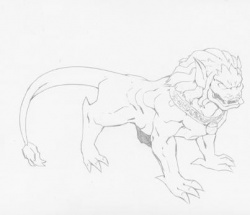Difference between revisions of "Fu-Dog"
Phoenician (talk | contribs) |
Phoenician (talk | contribs) |
||
| Line 4: | Line 4: | ||
==History== | ==History== | ||
| − | Fu-Dog hatched at an unspecified point in time. Fu-Dog is fiercely loyal to Brooklyn. {{CIT|When [[Brooklyn]] visited [[Xanadu, China|Xanadu]] during his [[TimeDancer]] adventures,}} Fu-Dog joined him as his {{CIT|first}} companion. [http://www.s8.org/gargoyles/askgreg/search.php?qid=19816] In 210 | + | Fu-Dog hatched at an unspecified point in time. Fu-Dog is fiercely loyal to Brooklyn. {{CIT|When [[Brooklyn]] visited [[Xanadu, China|Xanadu]] during his [[TimeDancer]] adventures,}} Fu-Dog joined him as his {{CIT|first}} companion. [http://www.s8.org/gargoyles/askgreg/search.php?qid=19816] In [[Timeline#Before_971|210 BC]], the two encountered [[Terracotta Warriors|terracotta warriors]]. The two of them visited [[Timeline#2198_And_Beyond|2198]] together with [[Katana]]{{CIT|, and jointly battled the [[Space-Spawn]] as part of [[Samson|Samson's]] [[Resistance|resistance movement]]}}. [http://www.s8.org/gargoyles/askgreg/search.php?qid=3744] The three (with [[Nashville|Gnash's]] [[Gargoyle Egg|egg]]) also visited the [[U.S.S. Nashville|U.S.S. ''Nashville'']] in 1942. ''([[Underwater|"Underwater"]])'' {{CIT|Ultimately, they visited feudal [[Japan]] and many other locales and times.}} [http://www.s8.org/gargoyles/askgreg/search.php?qid=3683] |
Eventually, in [[Timeline#1997|1997]], Fu-Dog returned with Brooklyn, Katana, and Nashville (and an unhatched [[Egwardo|egg]]) to [[Manhattan]] and from that point on was a member of the Manhattan Clan. He and [[Bronx]] regularly keep watch over [[Egwardo]] in the [[rookery]] and he continues to be fiercely protective of the egg to the point where Katana had to calm him when other clan members approached it. ''([[Phoenix|"Phoenix"]], [[Idyll or Nightmare|"Idyll or Nightmare"]])'' | Eventually, in [[Timeline#1997|1997]], Fu-Dog returned with Brooklyn, Katana, and Nashville (and an unhatched [[Egwardo|egg]]) to [[Manhattan]] and from that point on was a member of the Manhattan Clan. He and [[Bronx]] regularly keep watch over [[Egwardo]] in the [[rookery]] and he continues to be fiercely protective of the egg to the point where Katana had to calm him when other clan members approached it. ''([[Phoenix|"Phoenix"]], [[Idyll or Nightmare|"Idyll or Nightmare"]])'' | ||
Revision as of 18:14, 1 January 2025
Fu-Dog is a gargoyle beast, originally part of the Xanadu Clan in China at some unspecified point in time, and now a member of the Manhattan Clan. [1]
History
Fu-Dog hatched at an unspecified point in time. Fu-Dog is fiercely loyal to Brooklyn. When Brooklyn visited Xanadu during his TimeDancer adventures, Fu-Dog joined him as his first companion. [2] In 210 BC, the two encountered terracotta warriors. The two of them visited 2198 together with Katana, and jointly battled the Space-Spawn as part of Samson's resistance movement. [3] The three (with Gnash's egg) also visited the U.S.S. Nashville in 1942. ("Underwater") Ultimately, they visited feudal Japan and many other locales and times. [4]
Eventually, in 1997, Fu-Dog returned with Brooklyn, Katana, and Nashville (and an unhatched egg) to Manhattan and from that point on was a member of the Manhattan Clan. He and Bronx regularly keep watch over Egwardo in the rookery and he continues to be fiercely protective of the egg to the point where Katana had to calm him when other clan members approached it. ("Phoenix", "Idyll or Nightmare")
In July 1997, Hudson relieved Fu-Dog and Bronx of their egg guarding duties and they together explored the city. When Bronx caught a familiar scent, the two beasts encountered Jade and Turquesa, who had recently arrived in Manhattan, and led the gargoyles back to the Eyrie Building. ("Questions", "Quo Vadis Cum Hoc?")
On Halloween 1997, Katana instructed Fu-Dog and Bronx to discreetly follow Gnash as the young gargoyle went trick-or-treating. After moving throughout the city, and even riding atop a subway car, he fought the Quarrymen and met Terry Chung, and Billy and Susan Greene. ("Trick-Or-Treat")
Characteristics

Fu-Dog has green skin and a brown lion-like mane. He has four small horns on his brow and a long tufted tail. He wears a gold collar on his neck. As of his joining on the Manhattan Clan in 1997, he is at least 29 years old (He was traveling with Brooklyn before Nashville's egg was laid: Nashville is 19 years old in 1997, plus the 10 years for the egg to incubate).
Appearances
Note: This character does not speak, therefore he does not have any lines.
- "Phoenix" (First Appearance)
- "Idyll or Nightmare"
- "Underwater"
- "Cold Comfort"
- "Questions"
- "Quo Vadis Cum Hoc?"
- "Acquisitions"
- "Trick-Or-Treat"
- "Unequivocal Success"
- "Queen of All She Surveys"
- "Bronx"
Real World Background
Fu-dogs, in the real world, are statues of strange beasts found in East Asia, especially China, and also known as fu-lions, shishi, and shisa. They are believed to be protector-figures, and therefore function quite effectively as a Chinese equivalent to gargoyles. Fu-dog's name obviously reflects this, suggesting that in the Gargoyles Universe, fu-dogs were inspired by local gargoyle beasts in the same way that the architectural gargoyles on the castles and cathedrals of medieval Europe were inspired by gargoyles living in those regions. In the real world, fu-dogs originated in China, and are believed to be a combination of travellers' descriptions of lions (which are not native to China) and common dog breeds. They may also have been inspired, in part, by similar statues built in India. They are placed in pairs outside the doorways of buildings, which they are believed to guard from danger. Traditionally, one of a pair of statues is female, indicated by a cub under its paw, while the other of the pair is male, identified by a ball under its paw.
Fu-lions are only the most numerous and well-known of the East Asian guardian beasts. Other types of statues included the Korean haetae, the winged bixie or pi-xiu, and statues of qi-lin.
See Also
- Fu-Dogs at Wikipedia, the Free Encyclopedia
